The Life of Nagarjuna
Dr. Alexander Berzin Continue reading
Dr. Alexander Berzin Continue reading
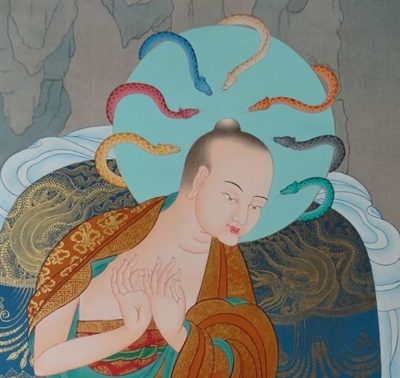
Nagarjuna: If one benefits sentient beings, that is the best of offerings to me.
Nagarjuna: Praise To Satisfying Sentient Beings
In the Indian language: Sattva radha nastavam.
In the Tibetan language: sems can mgu bar bya ba’i bstod pa
In the English language: Praise to Satisfying Sentient Beings
Homage to Manjushri!
1 Respecting me is [to work for] the welfare of sentient beings,
because respect [for me] is not otherwise.
Whoever did not give up compassion, that one respects me; Continue reading
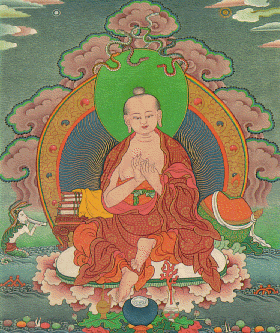
BODHICITTA VIVARANA
A Commentary on the Awakening Mind
Nagarjuna
Sanskrit title: Bodhicittavivarana
Tibetan title: byang chub sems kyi ‘grel pa
Homage to glorious Vajrasattva!
It has been stated:
Devoid of all real entities;
Utterly discarding all objects and subjects,
Such as aggregates, elements and sense-fields;
Due to sameness of selflessness of all phenomena,
One’s mind is primordially unborn;
It is in the nature of emptiness. Continue reading
NAGARJUNA
BODHISAMBHARAKA
THE ACCUMULATIONS FOR ENLIGHTENMENT
1. Now, in the presence of the Buddhas, I fold my hands and bow
my head. I intend to explain according to tradition a Buddha’s
accumulations for enlightenment. Continue reading
Nagarjuna (1st – 2nd century CE), the great Indian Buddhist master, wrote this letter of advice Suhrllekha, in verse, to a king that was a friend. Although short at only 123 verses, it is considered to be a monument in the Indian Buddhist tradition, and covers the Mahayana path with uncommon clarity, and is for this reason much quoted by many great Tibetan masters. Continue reading
Nagarjuna: In Praise of the Transcendental
HYMN TO [THE BUDDHA,] THE WORLD TRANSCENDENT by Nagarjuna
Sanskrit title: Lokatistava Continue reading
Ārya Nāgārjuna: The Fundamental Wisdom of the Middle Way – Root Stanzas on the Middle Way, Sanskrit: Mula madhyamaka karika. Continue reading
The Precious Garland, Ratnavali by Arya Nagarjuna
Homage to all Buddhas and Bodhisattvas. Continue reading
The Heart of Interdependent Origination
Nagarjuna’s Commentary to The Heart of Interdependent Origination
An Introduction to Nagarjuna’s Heart of Interdependent Origination Continue reading
IN PRAISE OF THE DHARMADHATU
by Arya Nagarjuna
1. There is something which as long as left unknown Continue reading
SUNYATASAPTATI
by
Arya Nagarjuna
Translated by Christian Lindtner
[1] Though the Buddhas have spoken of duration, origination, destruction, being, non-being, low, moderate, and excellent by force of worldly convention, [they] have not done [so] in an absolute sense.
[2] Designations are without significance, for self, non-self, and self-non-self do not exist. [For] like nirvana, all expressible things are empty (sunya) of own-being.
[3] Since all things altogether lack substance — either in causes or conditions, [in their] totality, or separately — they are empty.
[4] Being does not arise, since it exists. Non-being does not arise, since it does not exist. Being and non-being [together] do not arise, due to [their] heterogeneity. Consequently they do not endure or vanish. Continue reading
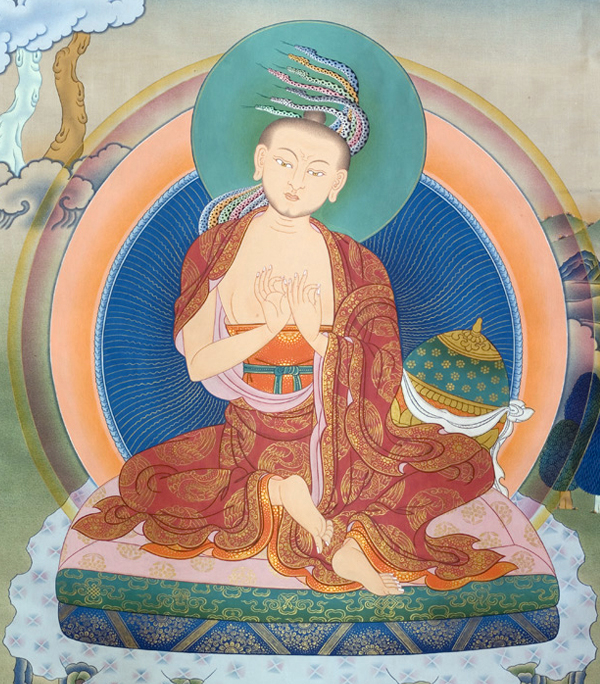
Arya Nagarjuna
Great Praise of the Ten Acts of the Buddha
by Arya Nagarjuna
With skilful means and compassion, you were born in the Shakya clan,
Unconquerable by others, you vanquished Mara’s hordes,
Your physical form resplendent, like a mountain of gold.
To you, the King of the Shakyas, I pay homage!
You I shall praise, who first awakened the mind of enlightenment,
Then completed the accumulations of merit and wisdom, Continue reading
by Ārya Nāgārjuna
In the language of India: pratītyasamutpāda hṛdaya kārikā Continue reading
Nāgārjuna: In Praise of Dharmadhātu
I pay homage to Youthful Mañjuśrī.
I bow to you, the dharmadhātu,
Who resides in every sentient being.
But if they aren’t aware of you,
They circle through this triple being. [1] Continue reading
I’ll tell you briefly the fine qualities
Of those on the path of compassion: Continue reading
The Treatise on the Provisions Essential to Enlightenment
The Bodhisambhāra Shāstra
By Ārya Nāgārjuna
001 Now, in the presence of all the Buddhas,
With palms pressed together, I bow down my head in reverence. Continue reading
Nagarjuna’s Mahamudra Vision [Twenty Mahayana Verses]
Homage to Manjusrikumarabhuta!
1. I bow down to the all-powerful Buddha
Whose mind is free of attachment,
Who in his compassion and wisdom
Has taught the inexpressible. Continue reading
The Twenty Verses on the Great Vehicle, Mahayanavimsaka by Nargarjuna
Adoration To The Three Treasures
Nargarjuna: Averting The Arguments Vigrahavyavartani
Part 1: The Arguments of the Opponents
1. If self-existence (svabhava) does not exist anywhere in any existing thing,
Your statement, itself being without self-existence, is not able to discard self-existence. Continue reading
Nagarjuna: Seventy Verses on Emptiness
Nagarjuna (who lived during the second century C.E) is regarded as the founder of the Madhyamaka school of Mahayana Buddhism. His most important work was the Mulamadhyamaka-karika (‘Fundamental Verses on the Middle Way’). Other important works included the Yuktisastika (‘Sixty Verses on Reasoning’), and the Shunyatasaptati (‘Seventy Verses on Emptiness’).
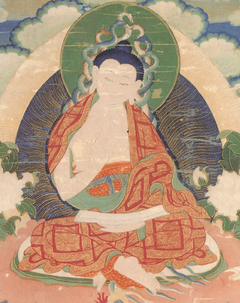
Nagarjuna (c. 150-250 CE) the founder of Madhyamika School.
In the language of India: Dvādaśakāra-nāma-stotra
In the language of Tibet: mdzad pa bcu gnyis kyi tshul la bstod pa
Homage to the Buddha Śākyamuni!
You I shall praise, who first awakened the mind of enlightenment,
Then completed the accumulations of merit and wisdom,
And now in this age, through the vast sway of your actions,
Have become the lord and protector of living beings.
Homage to you who, having taught the gods,
Knew the time had come to tame the human world, and
Descending from the god realm like a great elephant,
Foresaw the family of your birth and entered the womb of Māyādevī. Continue reading
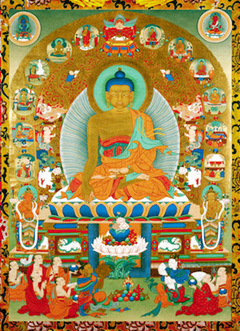
Buddha Sakyamuni
Ārya Nāgārjuna: Great Praise of the Twelve Acts of the Buddha
༈ཐབས་མཁས་ཐུགས་རྗེས་ཤཱཀྱའི་རིགས་སུ་འཁྲུངས།།
tabkhé tukjé shakyé rik su trung
With skilful means and compassion, you were born in the Śākya clan,
གཞན་གྱིས་མི་ཐུབ་བདུད་ཀྱི་དཔུང་འཇོམས་པ།།
shyen gyi mitub dü kyi pung jompa
Unconquerable by others, you vanquished Māra’s hordes,
གསེར་གྱི་ལྷུན་པོ་ལྟ་བུར་བརྗིད་པའི་སྐུ།།
ser gyi lhünpo tabur jipé ku
Your physical form resplendent, like a mountain of gold. Continue reading